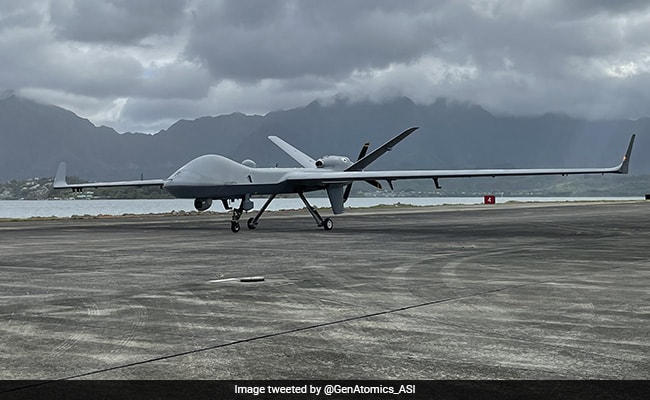[ad_1]

The MQ-9B predator armed drones is seen to be a key a part of India’s nationwide safety and protection wants.
Washington:
India and the United States are eager for an early conclusion of the 30 MQ-9B predator armed drones deal at a price of over USD 3 billion, which is able to assist New Delhi strengthen its total surveillance equipment alongside the Line of Actual Control (LAC) and the Indian Ocean.
In the works for greater than 5 years, the “ball is now in India’s court”, officers accustomed to the event mentioned Wednesday, with out explaining additional.
The MQ-9B predator armed drones — 10 every for 3 providers — is seen to be a key a part of India’s nationwide safety and protection wants.
The officers didn’t elaborate additional however dominated out that there was any bureaucratic hurdle or regulatory points concerned.
“I have to take that back and check on that,” Assistant Secretary of State for Political Military Affairs Jessica Lewis informed reporters right here when requested for the delay within the deal, which was introduced in the summertime of 2017.
It has been pending for fairly a while now, for causes not recognized within the public. However, the problems are believed to have been mentioned in the course of the conferences that the visiting National Security Advisor Ajit Okay Doval has had with prime American management, together with his counterpart Jake Sullivan.
During the conferences, it’s believed that each side expressed their eagerness to see that the drone deal is quick tracked. India is raring that an early resolution would assist it get an early supply of MQ-98 predator armed drones that may strengthen its nationwide safety and surveillance not solely within the Indian Ocean, but additionally alongside the LAC.
The Biden administration is eager on inking this deal as quickly as potential, which is able to create jobs and could be politically helpful forward of the following yr’s presidential elections, in line with individuals accustomed to the event.
“MQ-9B would enable its Indian military users to fly farther than anything else in this category, spend more time in the air and handle a greater diversity of missions than any other similar aircraft. The SkyGuardian and SeaGuardian can deliver full-motion video in virtually any conditions, day or night, as well as other kinds of detailed sensing with their onboard systems,” Vivek Lall, chief govt, General Atomics Global Corporation, informed PTI.
“The aircraft also can carry a wide variety of specialist payloads if they must adapt to a specific mission. A SkyGuardian becomes a SeaGuardian, for example, when it carries a 360-degree maritime search radar that gives users a quality of maritime domain awareness they can’t achieve any other way,” he mentioned.
Artificial intelligence, machine studying and different refined applied sciences assist unlock the wealthy feed of perception from these plane, analyse it and distribute it to those that want it to take fast choices, Lall mentioned.
“Other payloads include communications relays – so the aircraft can serve as a node connecting forces over land or sea – or other intelligence, surveillance or military systems. These aircraft can conduct search and rescue, help fight wildfires, support customs authorities, augment naval forces and take many other tasks,” he mentioned.
“In short, MQ-9B is the premier multi-role, long endurance remotely piloted aircraft in the world today. It is in high demand. Japan, Belgium, Great Britain, and several other nations are flying or are on track to begin flying them,” Lall mentioned.
Early within the day, Assistant Secretary of State for Political Military Affairs Lewis informed reporters that the India-US protection relationship has gained tempo.
“When we look at the relationship with India and our security cooperation with India and the defense relationship with India over the past 10 years or even a little bit longer, we’ve really seen that grow and evolve and change…in very positive ways,” Lewis mentioned in response to a query.
“I think all the discussions (during this week’s iCET dialogue) are in that context,” she mentioned, a day after the 2 international locations embarked upon the bold initiative in crucial and rising applied sciences.
“Everything from Indian procurement and or consideration of US systems and India’s competition, when they’re having competitions for specific systems, to just the across-the-board relationship between our defense department, the Ministry of Defense. So we see this as a place where we want to continue to work closely,” she mentioned.
“Without getting into any of the details of the conversation, I think it’s a very rich conversation right now. And one that we’re deeply committed to not only continuing but to have growth,” Lewis mentioned.
Responding to a query, the State Department official mentioned the US is able to assist India diversify its defence wants.
“When it comes to India, I think there are a whole host of options. Obviously, we need to work those out with the Indian government, see what the needs are. But I think there are a whole host of options in terms of us being able to find additional systems, ways to cooperate. Obviously respecting India’s own sort of rules of the game in terms of how that works. There’s a lot more that we can do together and hope we can continue to work on that,” Lewis mentioned.
Featured Video Of The Day
Agriculture Accelerator Fund To Encourage Agri Startups: Finance Minister
[adinserter block=”4″]
[ad_2]
Source link